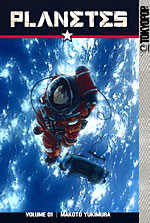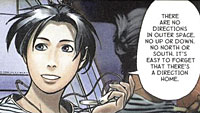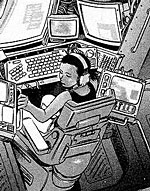>> The Book Review: The Horde
>> What About Bob? An interview with Bob Schreck, Part Two
More...

 Writer/Artist: Makoto Yukimara
Writer/Artist: Makoto Yukimara
Price: $9.99
Publisher: TokyoPop
ISBN: 1591822629
PLANETES is one of the books I give to people who say they don't like manga. That typically means they don't like martial arts-based fantasy series with teenage protagonists drawn with large emoting eyes. I understand the comment, but it's like condemning American comics because of a disdain for, say, Green Lantern.
The book is the story of Hachimaki, one of a three-man team of garbage men in the year 2074. Hachimaki, so called because of the bandana he's always wearing, is the son of a famous astronaut, who dreams of becoming rich and famous and owning his own spaceship. Like any twentysomething, he's also scared, uncertain, self-destructive and afraid. His uncertainty and fear about space and his life and his future are central to the story, and as in life, his troubles don't disappear quickly - it requires a great deal of time, effort and pain.
His crewmembers, while not the focus of the book, each has their own story, and it's fascinating how they play out. Yuri has been working as a garbage man longer than anyone and never complains. He's haunted by the death of his wife six years earlier, and in the first story he sees something in orbit and risks his life and ultimately Hachimaki's to save a compass that belonged to her.
In another story, Hachimaki is sidelined with a broken bone on the moon, and meets an old astronaut who discovers he's dying and a girl who was born on the moon. What could have been an eye-rolling slice of melodrama turns out to be a very simple story, part of Hachimaki's journey towards accepting what he does and what he wants, and one that reminds him how much he loves space.
 Fee, the ship's captain, is the most colourful character, and takes centre stage in the book's most comical and most serious story, in which a terrorist organisation, the Space Defense League, has been setting bombs on the lunar bases, many of them targeting the smoking sections. The story's juxtaposition of absurd humour and terrorism is an odd combination, but it's one that works, in large part because of the pacing, which moves along at a fast clip.
Fee, the ship's captain, is the most colourful character, and takes centre stage in the book's most comical and most serious story, in which a terrorist organisation, the Space Defense League, has been setting bombs on the lunar bases, many of them targeting the smoking sections. The story's juxtaposition of absurd humour and terrorism is an odd combination, but it's one that works, in large part because of the pacing, which moves along at a fast clip.
In the last story, Hachimaki is stranded and out of contact during a radiation storm, and though he's physically unharmed, he can't handle the isolation chamber testing that he needs to pass in order to go back into space. He tries a number of desperate moves until Yuri arranges a glimpse at the new engines being built for the upcoming Jupiter mission. "You've got to remember that we're all part of something larger than ourselves. Something extraordinary."
What's fascinating is that, as Hakimachi runs through this in his head, trying to get a grip on himself and his dreams, he comes to understand that there's more to these dreams than just personal ambition.
"Tsiolkovsky. Goddard. Oberth. Werhner Von Braun. They all dreamed of outer space...and lied to themselves that it was possible to get there. See? All of them had to delude themselves that what they dreamed of could even happen. And one day, they woke up to find that they were living a waking dream."
 At the end of the first volume, Yukimura goes back to the beginning, touching on the men who led the way to space. His fears and anxieties can be dealt with even if they will always be a part of him, but he gains perspective.
At the end of the first volume, Yukimura goes back to the beginning, touching on the men who led the way to space. His fears and anxieties can be dealt with even if they will always be a part of him, but he gains perspective.
Yukimura's artwork is remarkable for its control. He has refused to take a minimalist approach to his design work, but he has also refused to draw anything that he doesn't have to, and he achieves a fine balance between the futuristic and the familiar. His architecture is either classical or modern, but always recognisable, and his ships' interiors are crammed with monitors and keyboards that wouldn't look too out of place in an office.
One of the most engaging aspects of PLANETES is how much emphasis is placed on the danger of living and working in space. Between showing how the lower gravity can alter your muscles and bone structure, to the radiation levels that cause cancer, to the just unbearable fear of the vastness of space, Yukimura presents space as a hostile and dangerous place in a way that most science fiction makes a point of avoiding.
We live in a world today where the miraculous has become mundane. PLANETES shows us a glimpse of a future where, despite technological progress, that hasn't changed. Who among us wouldn't trade our jobs for the chance to be a garbage man in space?
Yukimura shows us that a future in space isn't necessarily glamorous - it's dangerous and hazardous out there in a way that makes life on Earth look bucolic - but there's a reason we keep looking up at night. There's also a reason why we read science fiction, and this is one of the best sci-fi books I've read in recent years.

This article is Ideological Freeware. The author grants permission for its reproduction and redistribution by private individuals on condition that the author and source of the article are clearly shown, no charge is made, and the whole article is reproduced intact, including this notice.


